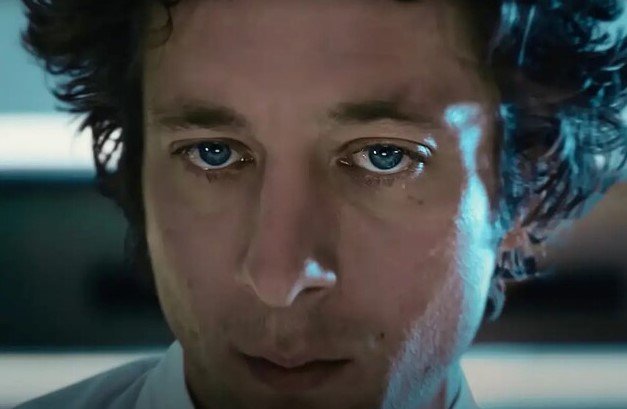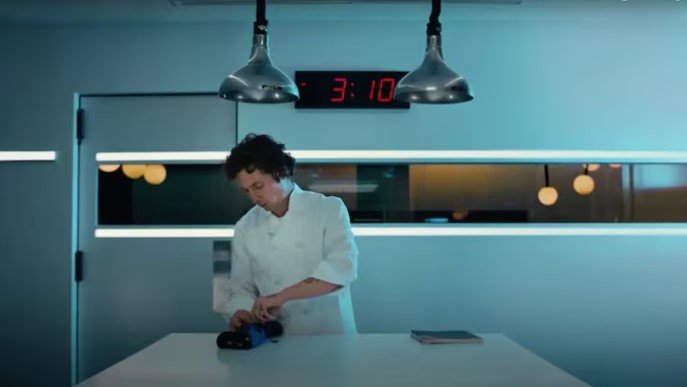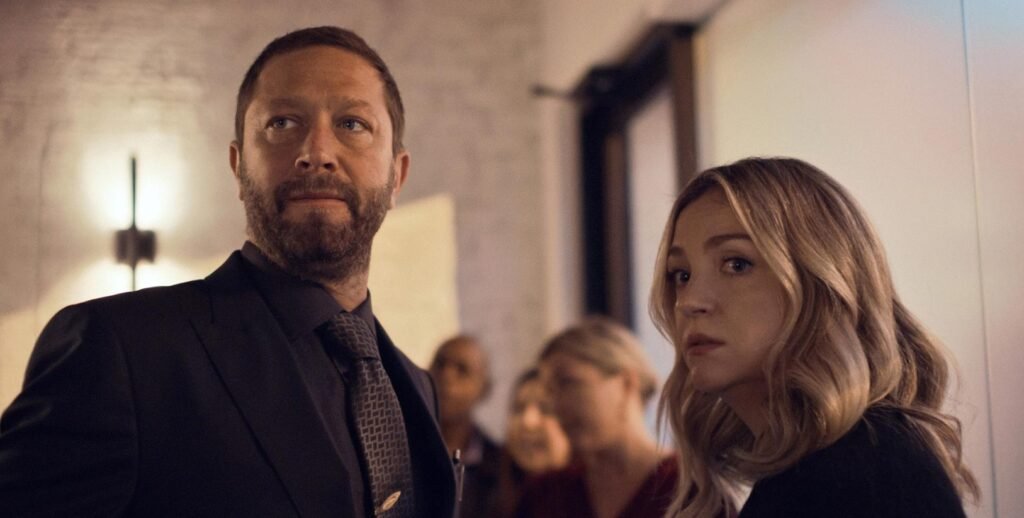The Bear Season 3 (DisneyHotstar) Story :-
The Bear Season 3 (DisneyHotstar) Carmy (Jeremy Allen White), Sydney (Ayo Edebiri), and Richie (Ebon Moss-Bachrach) are fully committed to transforming their beef stand into a prestigious fine dining establishment known as The Beef. They demand nothing less than excellence and are pushing themselves harder than ever before.
The Bear Season 3 (DisneyHotstar) Release Date, Trailer, Songs, Cast
| Release Date | 27 June 2024 |
| Language | English |
| Genre | Comedy, Drama |
| Episodes | 10 |
| Cast | Jeremy Allen White, Ebon Moss-Bachrach, Ayo Edebiri, Liza Colón-Zayas |
| Director | Christopher Storer, Duccio Fabbri, Ayo Edebiri, Joanna Calo |
| Writer | Christopher Storer, Alex Russell, Joanna Calo, |
| Cinematography | Andrew Wehde |
| Music | J.A.Q., Johnny Iguana, Trent Reznor, Atticus Ross |
| Producer | Joanna Calo, Hiro Murai, Christopher Storer, Matty Matheson, Josh Senior |
| Production | FX Productions, Super Frog |
| Certificate | 16+ |
The Bear Season 3 (DisneyHotstar) Review :-
The Bear Season 3 (DisneyHotstar) When we last left Carmy, Cousin Richie, Natalie, and the rest of the crew at The Bear, the Chicago restaurant at the heart of Hulu’s most-streamed new show of 2023, things were in disarray. Chef Carmen “Carmy” Berzatto (Jeremy Allen White) had retreated to the walk-in cooler during an anxiety attack, leaving his sous chef Sydney (Ayo Edebiri) to manage the kitchen. However, as Season 3 begins, the chaos and discord of the previous seasons dissipate, replaced by a tranquil montage of nostalgic flashbacks that gently ease viewers back into The Bear’s bustling yet distinct universe.
We first encounter Carmy long before The Bear’s inception, as he embarks on stages at renowned restaurants in New York and beyond, including memorable stints at Daniel Boulud’s Daniel and Noma in Copenhagen, both making cameo appearances. He collaborates with Luca (Will Poulter), the acclaimed pastry chef whose charm sparked a frenzy of admiration in Season 2, and hones his culinary craft under the guidance of chef Andrea Terry (Olivia Colman). Other flashbacks, such as memories of David (Joel McHale), the harsh chef who harshly criticized Carmy and his dishes, provide further context into Carmy’s journey and the pressures that led him to seek solace in the walk-in cooler.
Up until now, we’ve glimpsed Carmy’s personal and professional struggles briefly—moments like his interactions with David or his mother’s Christmas Day outburst—but in Season 3, these scars come sharply into focus. For the first time, the show paints a vivid picture of how Carmy became such a driven perfectionist. His past experiences deeply influence both his menu choices and his growing list of “non-negotiables,” a set of increasingly obsessive rules he believes will propel the restaurant to earn a coveted Michelin star. Carmy is so fixated on excellence that he decides to quit smoking—not for health reasons, but because he refuses to “waste five minutes” going outside for a cigarette.
By the end of Episode 2, viewers are thrust into the tumultuous world of the Berzatto family. Cousin Richie (Ebon Moss-Bachrach) and Carmy clash, while general manager Natalie (Abby Elliott) struggles to recruit new staff. Meanwhile, Neil Fak (Matty Matheson) is tasked with fixing an incessantly blinking light in the kitchen. Amidst the chaos, tensions rise and it begins to feel like the old The Bear again. The restaurant mirrors any struggling eatery, navigating Carmy’s constant menu adjustments and the high service standards demanded by both him and Richie, who oversees the front of house. They’ve also reopened the “beef window,” where Ebraheim (Edwin Lee Gibson) serves up delicious Italian beef sandwiches to a demanding local crowd.
As expected, the kitchen staff is facing challenges. Pastry chef Marcus (Lionel Boyce) is mourning his mother’s recent passing, struggling to cope during the Bear’s hectic opening days. Tina (Liza Colón-Zayas) finds herself overwhelmed on the grill station, despite Sydney’s patient mentoring. And Sydney herself? She’s beginning to feel the strain of always being the most composed and rational person in the room. Her dynamic with Carmy is also shifting, moving away from romantic implications as creator Christopher Storer emphasizes their evolving friendship and professional collaboration.
For many viewers, this outcome is preferable to the speculation surrounding a potentially tumultuous romantic entanglement between Sydney and Carmy. While it might be tantalizing to imagine their chemistry boiling over into a passionate affair, such a storyline would undercut Sydney’s crucial role in the restaurant’s development. She serves as the calm amidst Carmy’s storm, yet the series doesn’t fully acknowledge the depth of her contributions. Although Carmy offers her an ownership stake in the restaurant as a form of recognition, he struggles to connect with her on a personal level.
Carmy and Richie’s relationship remains perpetually complex. Despite Richie’s attempts to present himself as healed, using therapy language to critique Carmy’s emotional volatility and proclaiming the need for integration, his underlying angst is palpable. This tension occasionally erupts into heated arguments and physical altercations with Carmy in the kitchen, providing a cathartic release.
Meanwhile, Carmy struggles to cope with escalating pressures, despite faithfully attending 12-step meetings. He wrestles with persistent flashbacks of past traumas, relying heavily on nicotine gum and obsessively refining the restaurant’s menu. His fixation extends to minute differences in nearly identical stoneware bowls, accompanied by reckless spending habits. Thoughts of his ex-girlfriend Claire (Molly Gordon) haunt him, yet he finds himself unable to summon the courage to apologize. At any moment, it feels like Carmy is on the brink of returning to the walk-in cooler, overwhelmed by the slightest inconvenience.
The restaurant, against odds, appears to be thriving. There’s positive early buzz, and it’s bustling every night. Yet, beneath this initial success, deep-seated dysfunction simmers, though it’s concealed perhaps a bit too effectively. Amid interpersonal conflicts, financial uncertainties, and the inconvenient timing of Natalie’s impending childbirth, it feels like The Bear is constantly teetering on the edge of disaster. The series remains steadfastly committed to capturing the brinkmanship inherent in the restaurant industry.
Responding to criticisms about its classification as a comedy rather than a drama, especially amidst allegations of awards season “campaign fraud,” Storer and the show’s writers fully embrace the comedic potential in Season 3 of The Bear. While there are intense arguments, there are also genuinely humorous moments, such as Edebiri comically grappling with a towering stack of cardboard boxes inside a massive dumpster. This season strikes a better emotional balance than its predecessors, with these lighter moments offering a welcome relief from the underlying weightiness.
The series also finally gives its exceptional supporting cast a chance to shine. In Episode 6, titled “Napkins” and directed by Edebiri, Tina’s journey at The Bear takes center stage, revealing her evolution as a chef through dish workshops and culinary refinement. Marcus, inspired by personal tragedy, showcases his passion for pastry-making with stunning desserts. Meanwhile, Matheson charms as Neil Fak, clumsily navigating restaurant duties while feigning incompetence. The entire Fak family, including Neil’s brother Ted (Ricky Staffieri) and other quirky relatives in delightful cameos, provides a delightful contrast to the sharp-tongued Berzattos.
The Bear revisits its core theme of family dysfunction in “Ice Chips,” where Natalie reluctantly turns to her chaotic mother Donna (Jamie Lee Curtis) for support during her impending childbirth. The episode unfolds in 30-plus minutes of frenetic stress, driven by Curtis’s anxious portrayal and the inherent chaos of childbirth, capturing the essence of the Berzatto family dynamics. Amid moments of genuine tenderness and honesty, the Berzattos can’t help but engage in emotional jabs, reflecting a familiar familial dynamic that resonates despite its tumultuous nature. Curtis and Elliott deliver standout performances in these emotionally charged scenes, which stand as some of the season’s most poignant moments.
There are moments when The Bear feels like it’s tackling too many themes at once. The weighty issues it delves into — mental health, family trauma, food systems, economic instability, ageism, and toxic chef culture — sometimes overlap, leading to scenes that feel cluttered. The show shines brightest when its actors can unleash their emotional depth without the constraints of numerous intersecting plotlines. Even seemingly minor moments in Season 3, like the initial meeting between Carmy’s late brother Mikey (Jon Bernthal) and Tina, resonate deeply.
The Bear struggles to navigate Claire and Carmy’s relationship, stretching out their will-they-or-won’t-they dynamic over 10 episodes. Not even a well-intentioned intervention from the Fak brothers can untangle their complex emotions, and the show doesn’t exert much effort to resolve it. This ambiguity extends to every interpersonal relationship on the show; while it highlights why they’re in disarray, it offers few clear paths forward. This might reflect Carmy’s own uncertainty about achieving perfection, yet it leaves too many narrative threads dangling, preventing the series from feeling fully cohesive.
Knowing that The Bear has already filmed its fourth — and reportedly final — season, it’s understandable why many of the show’s core conflicts remain unresolved. However, much of Season 3 feels like a detour from what viewers really want to see. We’re eager for Carmy and Sydney to find common ground, for Marcus to flourish as a pastry chef, and for Tina to finally receive recognition. While there are moments of satisfying closure, such as Carmy’s confrontation with the abrasive chef David, these are rare in the series so far.
The show’s focus on celebrating restaurants and their chefs, while integral to its authenticity and appeal, sometimes overshadows its emotional core. This season, there’s an excessive emphasis on culinary reverence. The camera meticulously captures restaurant minutiae — from cleaning kitchen equipment to intricate cooking techniques — in a way that, for the first time, can feel draining. Extended shots of beautifully plated dishes evoke a sense of watching Chef’s Table, which can be frustrating when you’re eager to see the resolution of ongoing storylines, like how Carmy and the team handle their first night of service and the subsequent challenges they face later in the season.
In the final episode, “Forever,” which centers on a symbolic farewell to the real-life Chicago restaurant Ever, the abundance of top-tier chef cameos adds credibility but also leans heavily into fine dining promotion. Despite the cast’s dynamic chemistry, the episode and season as a whole miss opportunities to delve deeper into characters like Tina, Marcus, and Ebraheim, as well as the unsung heroes of The Bear—dishwashers, porters, and servers—who play crucial roles behind the scenes. Sydney’s struggle amidst the chaos is underexplored, leaving Season 3 of The Bear feeling somewhat adrift. Carmy remains uncertain, Sydney overwhelmed, and the looming impact of mixed critical reception on Uncle Cicero’s continued support casts further uncertainty over the restaurant’s future.
The season both begins and concludes at a pivotal juncture for this ensemble. The restaurant’s uncertain future looms large, leaving ample room for anticipation as we look forward to Season 4. Hopefully, Storer has taken to heart the poignant wisdom imparted by Chef Terry to the gathered chefs in the season finale: “It’s not the food people remember. It’s the people.”











